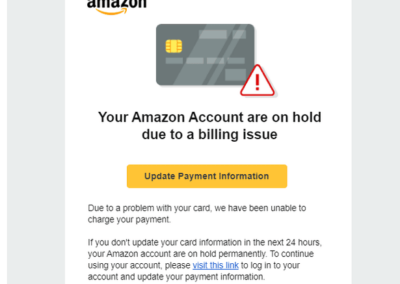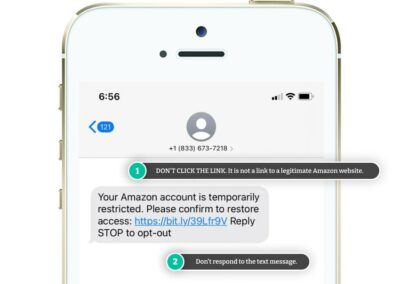Navigating Safely
Protecting Yourself from Amazon Scams
In the vast realm of online shopping, Amazon stands as a titan, offering convenience and a vast array of products. However, with its popularity comes the unfortunate reality of scams that can target unsuspecting users. In this blog post, we’ll explore common Amazon scams and provide practical tips on how you can protect yourself from falling victim to these deceptive tactics.
1. Phishing Emails and Websites
One prevalent Amazon scam involves phishing emails or fake websites designed to mimic the Amazon platform. These emails often claim there is an issue with your account, urging you to click on a link to resolve the problem. To protect yourself:
-
Verify the Sender: Check the sender’s email address carefully. Legitimate emails from Amazon will come from addresses ending in “@amazon.com.”
-
Hover Over Links: Hover your mouse over any links in the email to preview the destination URL. Be cautious if the link doesn’t match the official Amazon website.
-
Use Two-Factor Authentication (2FA): Enable 2FA on your Amazon account for an additional layer of security.
2. Fake Customer Support Calls
Scammers may impersonate Amazon customer support representatives, contacting users via phone to address supposed issues with their accounts or orders. Stay vigilant by:
-
Initiating Contact: If you receive an unexpected call, hang up and initiate contact with Amazon directly using the official customer support channels.
-
Never Share Sensitive Information: Amazon representatives will never ask for sensitive information like passwords or credit card details over the phone.
3. Counterfeit Product Scams
Some sellers on Amazon may list counterfeit or fake products, posing a threat to both your finances and safety. Protect yourself by:
-
Check Seller Ratings: Before making a purchase, review the seller’s ratings and feedback. Avoid those with a dubious reputation.
-
Research the Product: If a deal seems too good to be true, it probably is. Research the product and compare prices to ensure its authenticity.
4. Gift Card Scams
Scammers often request payment through gift cards, claiming it’s for resolving issues or making a purchase. Guard against this by:
-
Verify Requests: Amazon will never ask for payment through gift cards. Treat any such requests with skepticism.
-
Confirm with Amazon: If in doubt, contact Amazon directly to verify the legitimacy of any payment request.
5. Keep Software Updated
Regularly updating your device’s operating system and security software adds an extra layer of protection against malware and phishing attempts.
While Amazon continually invests in security measures, staying informed about potential scams and practicing vigilance is crucial. By adopting these protective measures, you can navigate the world of online shopping securely, ensuring that your Amazon experience remains convenient and worry-free.






